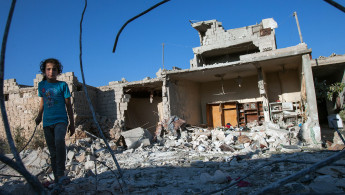Idlib offensive imminent?
“The battle will be managed from a joint operations room for all participating factions”, a Nusra source told the site. “There are three operations rooms; two are fake and one is real. One of the operations rooms is located in the town of Sarmin, which was attacked two days ago with toxic gas. The operations room may have been one of the reasons why.”
According to the source, Nusra is contributing with the majority of fighters (3,000) in this offensive, along with infiltration fighters to create gaps in enemy lines. “Each faction is responsible for certain fronts; Nusra will cover west Idlib and Broma Farms in the north west, while Ahrar al-Sham will cover east Idlib, around Binnish, and Suqur al-Sham will cover the southern fronts,” the source said.
Idlib city, now under government control, has changed hands several times during the conflict. Rebel forces currently hold much of the rest of the governorate. Recent days have seen large-scale military mobilisation among these forces, as well as a mass exodus of civilians, especially after the chemical attack on Sarmin.
“A large number of families have been moving towards Turkey, while the area is witnessing unprecedented mobilisation of fighters, military equipment and armoured vehicles”, said a Binnish-based activist, adding: “Meanwhile, the regime’s air force continues to fly over the town and occasionally drop explosive barrels.”
Mobilization on a similar scale is also reported to have taken place among regime forces in the city itself, along with significant movement of civilians in the direction of Latakia. Regime forces are believed now to have closed all roads in and out of Idlib. The government has announced the evacuation of some its offices and institutions in the city to Jisr al-Shughur, which it also controls.
“Criminal” gas attack
On 17 March the Syrian air force attacked the small town Sarmin, east of Idlib, with chlorine gas, killing six people from the same family and injuring many others. The National Coalition of Revolutionary and Opposition Forces demanded that a fact-finding mission be sent to Sarmin promptly by the UN and that an investigation be opened on the incident.
“Criminals should be held responsible and punished according to measures stipulated in Security Council Resolution 2118”, said a Coalition statement. “The Security Council’s responsibilities oblige it to implement the articles of Resolution 2209, stipulating that chlorine gas is a toxic chemical weapon and considering its use in military operations a flagrant violation of international law and Resolution 2118.”
The Coalition also stated that Articles 6 and 7 of the latest Security Council resolution stress that “those responsible for the use of chemical weapons — including chlorine — must be held accountable”, adding: “In the event of non-compliance with Resolution 2118 (2013), it should impose measures under Chapter VII of the United Nations Charter.”
Khaled al-Aswad, Director of the Kafr Takharim hospital, confirmed that the gas attack on Sarmin had caused six deaths, including women and children, and more than 90 injuries. He added that there were two attacks, the first with two explosive barrels loaded with chlorine, resulting in 25 injuries, then another half an hour later, resulting in the six deaths and 70 injuries.
Victims showed “respiratory symptoms with varying degrees of severity, leading to the inflammation of the respiratory tract, redness of the eyes, nausea, vomiting and dizziness”, Aswad said. He added that the hospital was in need of oxygen cylinders, sprays, salbutamol inhalers and budesonide to treat the cases, as well as protective suits for the medical teams.





![The UAE is widely suspected of arming the RSF militia [Getty]](/sites/default/files/styles/image_330x185/public/2024-11/GettyImages-472529908.jpg?h=69f2b9d0&itok=Yauw3YTG)
![Netanyahu furiously denounced the ICC [Getty]](/sites/default/files/styles/image_330x185/public/2024-11/GettyImages-2169352575.jpg?h=199d8c1f&itok=-vRiruf5)
![Both Hamas and the Palestinian Authority welcomed the ICC arrest warrants [Getty]](/sites/default/files/styles/image_330x185/public/2024-11/GettyImages-2178351173.jpg?h=199d8c1f&itok=TV858iVg)